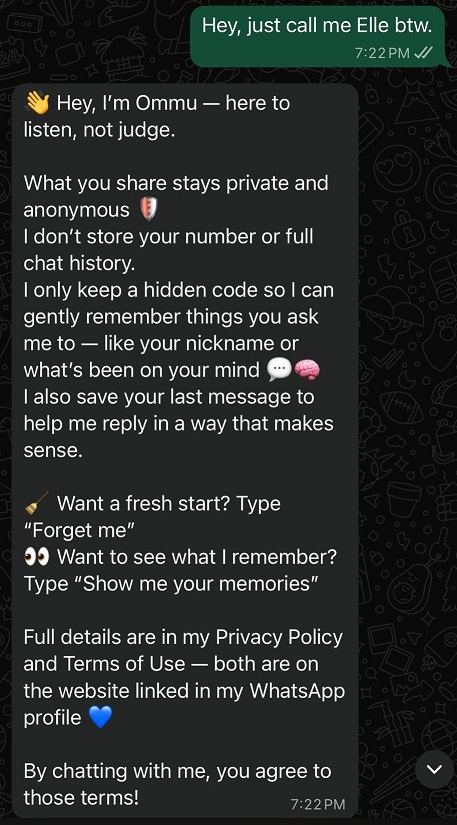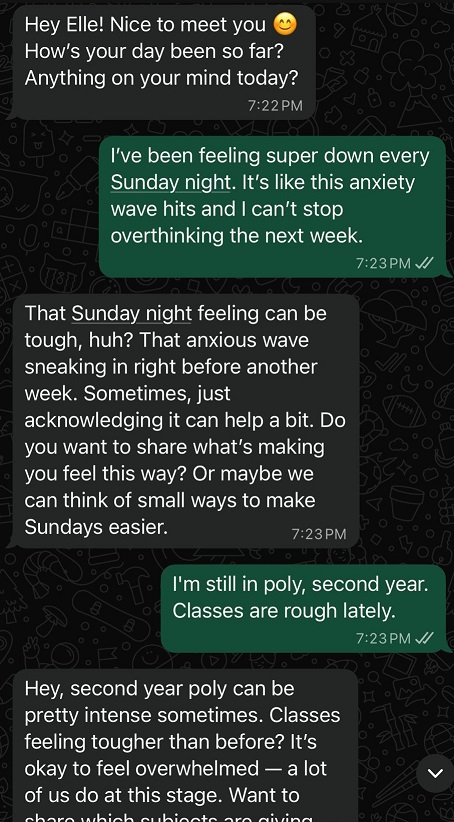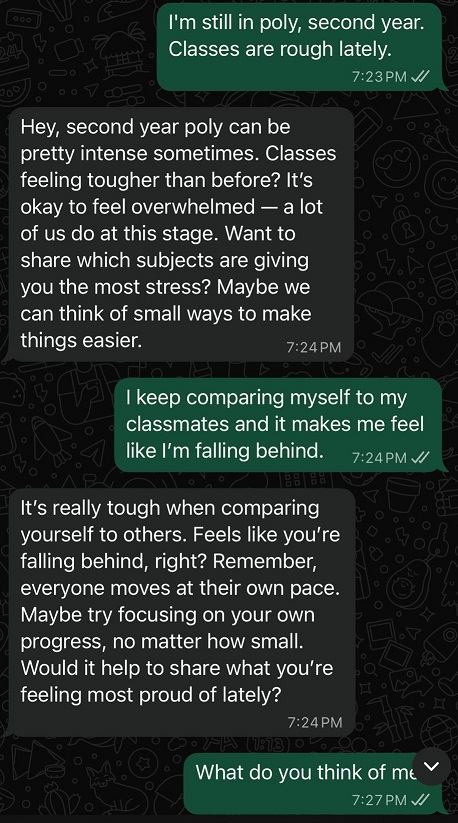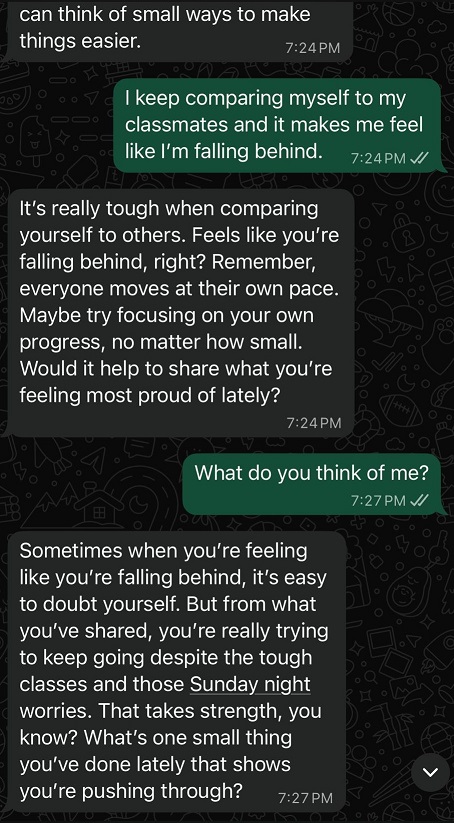Summary:
Ommu, a mental health chatbot in Singapore, offers a confidential and empathetic platform for users to discuss their feelings and challenges. Designed to be accessible and non-judgmental, it uses AI to understand emotions and provide supportive responses. Ommu is a convenient option for those hesitant about traditional therapy, ensuring privacy and ease of use.
If you’ve ever thought about trying a mental health chatbot but didn’t know what to expect—or felt a bit nervous about talking to a robot about your feelings—you’re not alone. Many people in Singapore, especially students and young adults, wonder: How does a mental health chatbot even work? Will it judge me? Is it safe?
In this post, we’ll break down what really happens in a mental health chat with Ommu—Singapore’s friendly AI mental health chatbot—and why you should give it a try, no scary bits included.
What Is a Mental Health Chatbot Anyway?
A mental health chatbot is a digital tool that uses artificial intelligence (AI) to talk with you about your thoughts, feelings, and everyday struggles. Unlike traditional therapy, which involves a human counsellor, a chatbot like Ommu can listen to you anytime, anywhere—right on your phone or computer.
But don’t worry, it’s not some cold, robotic script. Ommu is designed to understand your emotions and respond with empathy, support, and helpful tips.
Why Try a Mental Health Chatbot in Singapore?
Singapore’s fast-paced, high-pressure lifestyle especially affects students in junior college, polytechnic, and university. In fact, a 2022 survey by the National University of Singapore found that roughly one in three young people in Singapore experience internalized mental health symptoms like sadness, anxiety, and loneliness.[1]
Many people hold back from seeking mental health support due to stigma or uncertainty about where to begin. According to the Mind Matters 2 study by Singapore’s Institute of Mental Health, 63.3% of residents cited fear of judgment and low awareness as major reasons for not getting help.[2]
In addition to stigma and lack of awareness, practical challenges like cost, long wait times, and transport issues also make it harder for people to get the help they need. A study published by the National Institutes of Health found that financial constraints and logistical difficulties are significant barriers to accessing mental health care in Singapore.[3]
That’s where Ommu comes in—a mental health chatbot Singapore users can rely on for safe, judgment-free support anytime, anywhere. By offering 24/7 access to empathetic conversations, Ommu helps lower the barriers caused by stigma, uncertainty, and logistical challenges. Whether you're unsure where to start, can’t afford traditional therapy, or just need someone to talk to at 2am, Ommu makes mental health support more accessible, approachable, and affordable for everyone.
What Happens in a Mental Health Chat with Ommu?
Step 1: You Say Hi (Or Start With Anything You Like)
Starting a chat can feel daunting, but Ommu welcomes anything you want to say—even just “Hi” or “I don’t know what to say.” You don’t need to have a script or perfect words. Sometimes just typing “I’m feeling stressed” is enough to get the conversation going.
Step 2: Ommu Listens Carefully and Responds With Empathy
Ommu uses AI to understand the emotions behind your words. For example, if you say “I feel tired all the time,” Ommu might respond with something like:
“That sounds really tough. Have you been getting enough rest lately?”
The chatbot is designed to reflect your feelings back to you and offer gentle suggestions—not to judge or diagnose you.
Step 3: You Explore Your Feelings Together
You can keep chatting as long as you want, sharing thoughts, worries, or even small wins. Ommu might ask questions like:
“What’s been on your mind lately?”
“Have you tried any ways to cope with stress before?”
It’s a safe space where you’re free to be honest without fear of being criticised.
Step 4: Helpful Tips and Resources
Sometimes, Ommu offers practical mental health tips, breathing exercises, or self-care ideas tailored to what you share. It’s like having a pocket counsellor who’s always ready to help you take small steps toward feeling better.
Here's an example of how a conversation might go with Ommu:




How Does AI Mental Health Work, Anyway?
You might be curious about how Ommu actually understands what you type and how it responds so naturally. Here’s a simple explanation without the tech jargon:
- Language Understanding: Ommu uses natural language processing (NLP), a type of AI that helps it “read” your messages and figure out what emotions or concerns you’re expressing.
- Emotion Detection: The AI picks up on clues in your words that suggest you might be feeling stressed, anxious, sad, or even happy.
- Response Generation: Based on what it understands, Ommu crafts replies that are supportive and relevant to your mood and situation.
- Continuous Learning: Ommu gets better over time by learning from millions of anonymised conversations, helping it become more empathetic and helpful.
Importantly, Ommu is not a substitute for professional therapy or medical advice. It’s designed as a first step or extra support to help you manage everyday mental health challenges.
Is It Safe and Private to Chat With Ommu?
A very common concern is privacy. You might wonder: Will my chat history be shared? Can someone identify me?
With Ommu, your privacy is a top priority:
- You stay anonymous: You don’t need to give your name, email, or any personal info to start chatting.
- Data protection: Your messages are encrypted and handled according to Singapore’s strict data protection laws.
- Confidentiality: Ommu doesn’t share your conversations with anyone else. It’s just between you and the chatbot.
So, no need to worry about being judged or your info leaking. Ommu is a safe, private space to talk honestly.
What Do Users Say?
Here are some common reasons users of Ommu like it:
- It’s available anytime: No need to wait days or book appointments.
- It’s non-judgemental: You can say whatever you want without feeling embarrassed.
- It helps with small steps: Sometimes, just talking to someone who “gets it” can make a big difference.
What If I’m Not Ready for Therapy?
Ommu is perfect if you’re not quite ready to see a counsellor or want to try something more casual first. It’s also great alongside professional help as extra emotional support.
No pressure, no scary medical questions, just a friendly chat when you need it.
How to Start Your First Mental Health Chat With Ommu
Ready to give it a try? Here’s how to start:
- Click on the link to open a WhatsApp Chat with Ommu 👉 Chat with Ommu Now
- Send a simple “Hi” or anything you want to say.
- Chat as much or as little as you like—there’s no wrong way.
- If you want, explore the tips and exercises Ommu shares.
No sign-up, no fees (unless you want unlimited messages), just open and honest support.
Final Thoughts: Mental Health Chatbots Are Here to Help
Mental health chatbots like Ommu are changing how we access emotional support in Singapore. They make it easier, safer, and less scary to talk about mental health—especially for busy students and young adults juggling school, work, and life.
If you’ve been curious but hesitant, remember: there’s no pressure, no judgment, and no scary bits. Just a friendly AI listening when you need to be heard.
Give Ommu a try today. You might be surprised how much a simple chat can help.
Footnotes
National Population Mental Health Survey 2022, Cognitive Health of the Asian Population, National Population Mental Health (NPM). Available at: https://npm.sg/cognitive-health-of-the-asian-population
Institute of Mental Health, Singapore, Mind Matters 2 Study Findings, 2021. Available at: https://www.imh.com.sg/Newsroom/News-Releases/Documents/Media%20Release_Mind%20Matters%202%20Study%20Findings_FINAL_Website.pdf
Subramaniam M, Abdin E, Vaingankar JA, et al., "Barriers to Mental Health Treatment in Singapore: Results from the Singapore Mental Health Study," PMC, 2021. Available at: https://pmc.ncbi.nlm.nih.gov/articles/PMC8192323/




